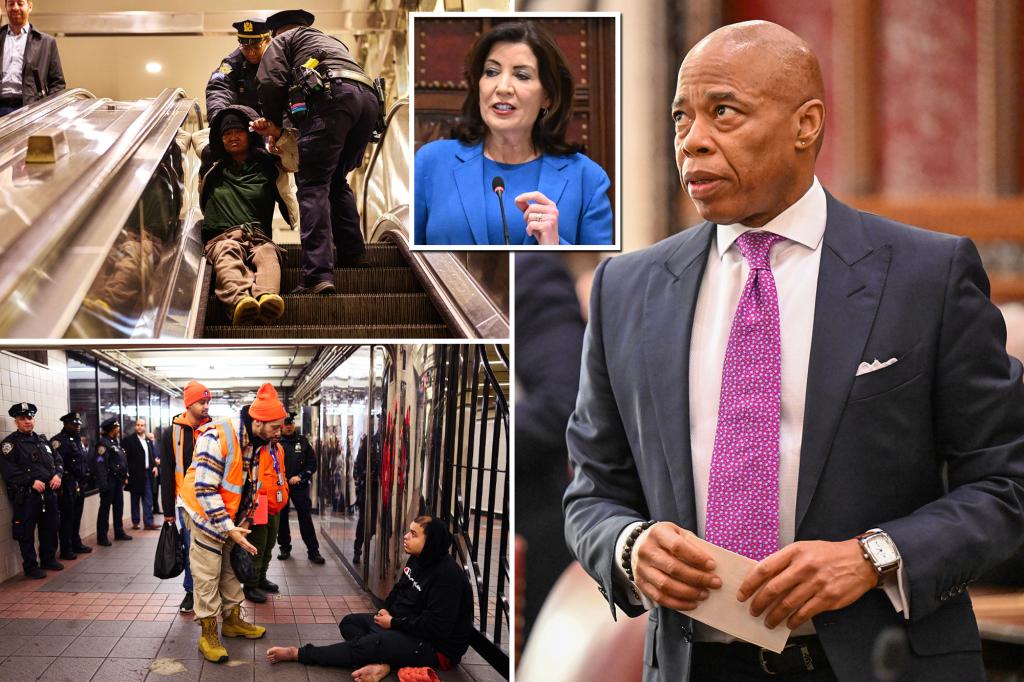Mayor Eric Adams embarked on a lobbying mission to Albany on Tuesday, engaging in a series of high-level meetings with Governor Kathy Hochul, Assembly Speaker Carl Heastie, and Senate Majority Leader Andrea Stewart-Cousins to advocate for several key initiatives crucial to New York City. Central to his agenda were the issues of managing the city’s mental health crisis, reforming the state’s discovery laws, and securing a tax break for low-income families. The meetings took place against the backdrop of recent high-profile incidents involving mentally ill individuals in the city, adding urgency to Adams’ call for action.
The hour-long meeting with Governor Hochul focused heavily on the mayor’s proposal to expand the city’s authority to remove and involuntarily commit seriously mentally ill individuals from public spaces. This controversial proposal has gained traction in the wake of recent tragedies, including the alleged stabbing deaths of three New Yorkers by a homeless man with a history of mental illness, and the chokehold death of Jordan Neely, a street performer with mental health issues. Adams argues that the current system is inadequate to address the needs of severely mentally ill individuals who pose a danger to themselves or others, and he seeks broader powers for the city to intervene.
The mayor’s push for expanded authority comes amid growing concern over how to best address the complex intersection of mental illness, homelessness, and public safety. The recent acquittal of Daniel Penny in the Jordan Neely case has further intensified the debate, highlighting the challenges and ethical dilemmas involved in intervening with individuals experiencing mental health crises in public spaces. While Adams defended Penny’s actions, he also emphasized the systemic failures that left Neely without adequate support and care. He stressed the need for proactive intervention and treatment for individuals struggling with mental illness, rather than relying on reactive measures after tragic incidents occur.
Beyond the mental health crisis, Adams also sought Hochul’s support for changes to the state’s discovery laws, which mandate the timely disclosure of evidence by prosecutors to defense attorneys. Adams and other law enforcement officials argue that the current rules, implemented in 2020, are overly burdensome and have contributed to a surge in dismissed cases, hindering their ability to effectively prosecute crimes. They contend that the rapid timeline for evidence disclosure, coupled with the sheer volume of materials required, often overwhelms prosecutors and leads to cases being dropped due to technicalities. Adams is seeking modifications to the law to streamline the process and provide a more manageable timeframe for evidence disclosure.
The mayor’s discussions with Assembly Speaker Heastie and Senate Majority Leader Stewart-Cousins further underscored the importance of these issues for New York City. Heastie acknowledged the urgency of addressing the mental health crisis and emphasized the need for solutions that prioritize treatment and support over incarceration. He also noted ongoing efforts by the state’s chief judges to introduce more uniformity into the discovery process, although he hadn’t yet received a formal request for legislative changes. These discussions highlight the complex political landscape surrounding these issues and the need for collaboration between city and state officials to achieve meaningful reform.
Adams also advocated for a tax break aimed at providing financial relief to low-income families. He emphasized the importance of putting money back into the pockets of working-class New Yorkers, arguing that this measure would boost the local economy and address economic inequality. While he didn’t require funding from Albany for this initiative, he needed state legislative approval to implement it. This request underscores the mayor’s focus on addressing economic challenges faced by many city residents, and his belief in the power of targeted tax relief to stimulate economic growth and improve the lives of working families.
The mayor’s visit to Albany coincided with the Electoral College vote, providing a strategic opportunity to engage directly with key state leaders and advance his agenda. The face-to-face meetings allowed him to personally convey the urgency of these issues and build support for his proposals. The discussions represent the beginning of a complex legislative process, and the outcomes remain uncertain. However, the mayor’s proactive engagement with state officials signals his commitment to addressing these critical challenges facing New York City. The success of his efforts will depend on his ability to navigate the political landscape and build consensus among state lawmakers.

